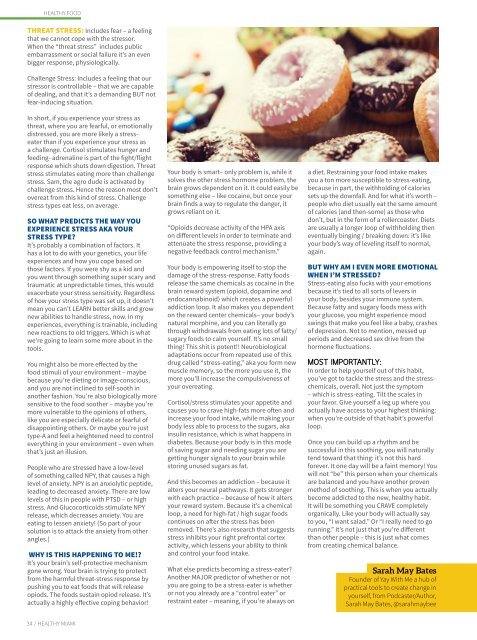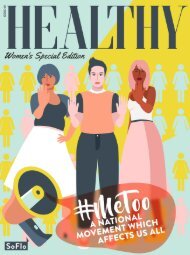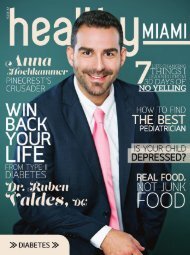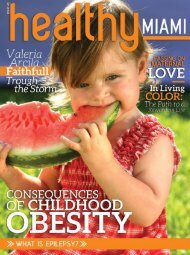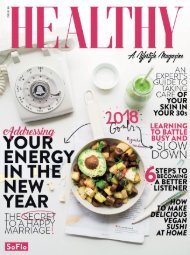JANUARY 2017 MIAMI for web
You also want an ePaper? Increase the reach of your titles
YUMPU automatically turns print PDFs into web optimized ePapers that Google loves.
HEALTHY FOOD<br />
THREAT STRESS: Includes fear – a feeling<br />
that we cannot cope with the stressor.<br />
When the “threat stress” includes public<br />
embarrassment or social failure it’s an even<br />
bigger response, physiologically.<br />
Challenge Stress: Includes a feeling that our<br />
stressor is controllable – that we are capable<br />
of dealing, and that it’s a demanding BUT not<br />
fear-inducing situation.<br />
In short, if you experience your stress as<br />
threat, where you are fearful, or emotionally<br />
distressed, you are more likely a stresseater<br />
than if you experience your stress as<br />
a challenge. Cortisol stimulates hunger and<br />
feeding- adrenaline is part of the fight/flight<br />
response which shuts down digestion. Threat<br />
stress stimulates eating more than challenge<br />
stress. Sam, the agro dude is activated by<br />
challenge stress. Hence the reason most don’t<br />
overeat from this kind of stress. Challenge<br />
stress types eat less, on average.<br />
SO WHAT PREDICTS THE WAY YOU<br />
EXPERIENCE STRESS AKA YOUR<br />
STRESS TYPE?<br />
It’s probably a combination of factors. It<br />
has a lot to do with your genetics, your life<br />
experiences and how you cope based on<br />
those factors. If you were shy as a kid and<br />
you went through something super scary and<br />
traumatic at unpredictable times, this would<br />
exacerbate your stress sensitivity. Regardless<br />
of how your stress type was set up, it doesn’t<br />
mean you can’t LEARN better skills and grow<br />
new abilities to handle stress, now. In my<br />
experiences, everything is trainable, including<br />
new reactions to old triggers. Which is what<br />
we’re going to learn some more about in the<br />
tools.<br />
You might also be more effected by the<br />
food stimuli of your environment – maybe<br />
because you’re dieting or image-conscious,<br />
and you are not inclined to self-sooth in<br />
another fashion. You’re also biologically more<br />
sensitive to the food soother – maybe you’re<br />
more vulnerable to the opinions of others,<br />
like you are especially delicate or fearful of<br />
disappointing others. Or maybe you’re just<br />
type-A and feel a heightened need to control<br />
everything in your environment – even when<br />
that’s just an illusion.<br />
People who are stressed have a low-level<br />
of something called NPY, that causes a high<br />
level of anxiety. NPY is an anxiolytic peptide,<br />
leading to decreased anxiety. There are low<br />
levels of this in people with PTSD – or high<br />
stress. And Glucocorticoids stimulate NPY<br />
release, which decreases anxiety. You are<br />
eating to lessen anxiety! (So part of your<br />
solution is to attack the anxiety from other<br />
angles.)<br />
WHY IS THIS HAPPENING TO ME!?<br />
It’s your brain’s self-protective mechanism<br />
gone wrong. Your brain is trying to protect<br />
from the harmful threat-stress response by<br />
pushing you to eat foods that will release<br />
opiods. The foods sustain opiod release. It’s<br />
actually a highly effective coping behavior!<br />
Your body is smart– only problem is, while it<br />
solves the other stress hormone problem, the<br />
brain grows dependent on it. It could easily be<br />
something else – like cocaine, but once your<br />
brain finds a way to regulate the danger, it<br />
grows reliant on it.<br />
“Opioids decrease activity of the HPA axis<br />
on different levels in order to terminate and<br />
attenuate the stress response, providing a<br />
negative feedback control mechanism.”<br />
Your body is empowering itself to stop the<br />
damage of the stress-response. Fatty foods<br />
release the same chemicals as cocaine in the<br />
brain reward system (opioid, dopamine and<br />
endocannabinoid) which creates a powerful<br />
addiction loop. It also makes you dependent<br />
on the reward center chemicals– your body’s<br />
natural morphine, and you can literally go<br />
through withdrawals from eating lots of fatty/<br />
sugary foods to calm yourself. It’s no small<br />
thing! This shit is potent!! Neurobiological<br />
adaptations occur from repeated use of this<br />
drug called “stress-eating,” aka you <strong>for</strong>m new<br />
muscle memory, so the more you use it, the<br />
more you’ll increase the compulsiveness of<br />
your overeating.<br />
Cortisol/stress stimulates your appetite and<br />
causes you to crave high-fats more often and<br />
increase your food intake, while making your<br />
body less able to process to the sugars, aka<br />
insulin resistance, which is what happens in<br />
diabetes. Because your body is in this mode<br />
of saving sugar and needing sugar you are<br />
getting hunger signals to your brain while<br />
storing unused sugars as fat.<br />
And this becomes an addiction – because it<br />
alters your neural pathways. It gets stronger<br />
with each practice – because of how it alters<br />
your reward system. Because it’s a chemical<br />
loop, a need <strong>for</strong> high-fat / high sugar foods<br />
continues on after the stress has been<br />
removed. There’s also research that suggests<br />
stress inhibits your right prefrontal cortex<br />
activity, which lessens your ability to think<br />
and control your food intake.<br />
What else predicts becoming a stress-eater?<br />
Another MAJOR predictor of whether or not<br />
you are going to be a stress-eater is whether<br />
or not you already are a “control eater” or<br />
restraint eater – meaning, if you’re always on<br />
a diet. Restraining your food intake makes<br />
you a ton more susceptible to stress-eating,<br />
because in part, the withholding of calories<br />
sets up the downfall. And <strong>for</strong> what it’s worth –<br />
people who diet usually eat the same amount<br />
of calories (and then-some) as those who<br />
don’t, but in the <strong>for</strong>m of a rollercoaster. Diets<br />
are usually a longer loop of withholding then<br />
eventually binging / breaking down: it’s like<br />
your body’s way of leveling itself to normal,<br />
again.<br />
BUT WHY AM I EVEN MORE EMOTIONAL<br />
WHEN I’M STRESSED?<br />
Stress-eating also fucks with your emotions<br />
because it’s tied to all sorts of levers in<br />
your body, besides your immune system.<br />
Because fatty and sugary foods mess with<br />
your glucose, you might experience mood<br />
swings that make you feel like a baby, crashes<br />
of depression. Not to mention, messed up<br />
periods and decreased sex drive from the<br />
hormone fluctuations.<br />
MOST IMPORTANTLY:<br />
In order to help yourself out of this habit,<br />
you’ve got to tackle the stress and the stresschemicals,<br />
overall. Not just the symptom<br />
– which is stress-eating. Tilt the scales in<br />
your favor. Give yourself a leg up where you<br />
actually have access to your highest thinking:<br />
when you’re outside of that habit’s powerful<br />
loop.<br />
Once you can build up a rhythm and be<br />
successful in this soothing, you will naturally<br />
tend toward that thing: it’s not this hard<br />
<strong>for</strong>ever. It one day will be a faint memory! You<br />
will not “be” this person when your chemicals<br />
are balanced and you have another proven<br />
method of soothing. This is when you actually<br />
become addicted to the new, healthy habit.<br />
It will be something you CRAVE completely<br />
organically. Like your body will actually say<br />
to you, “I want salad.” Or “I really need to go<br />
running.” It’s not just that you’re different<br />
than other people – this is just what comes<br />
from creating chemical balance.<br />
Sarah May Bates<br />
Founder of Yay With Me a hub of<br />
practical tools to create change in<br />
yourself, from Podcaster/Author,<br />
Sarah May Bates, @sarahmaybee<br />
34 / HEALTHY <strong>MIAMI</strong>


